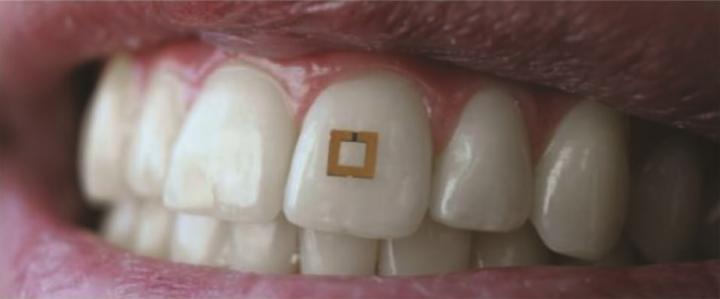tooth-sensor
Do you think the Vitebite is not accurate or that Apple's watch is not interfering adequately?
If so, developing a wearable device that sticks to your teeth may be right for you.
Researchers at Tufts University produced a device similar to this idea. They developed a sensitive adhering to the teeth and monitored the quality of the food. This may be useful, but it may aggravate our unhealthy handling of food.
The area is two square meters and is attached to the teeth. It is simply characterized by its composition. When its central layer is exposed to different chemicals such as salt or ethanol, its electrical properties change, sending different radio waves. The device is now designed to wirelessly send glucose, salt and alcohol information to a mobile phone. According to a press release, designers are looking to modify it to monitor more materials and measurements that include "a wide range of nutrients, chemicals and physiological conditions."

Photo rights: Vio Ominito, PhD student, Tufts University.
This sensor can be widely deployed because of its simple and inexpensive design. This may be a great help for researchers who need a cheap way to study nutrients. It also helps people who want to monitor their food and can not buy other fitness monitors because they are expensive, especially since we do not remember what we ate and how much we ate.
But this sensitivity may cause some side effects.
Calorie and exercise tracking applications allow people to monitor their diets and nutrients, and evidence suggests that this may exacerbate obsessive-compulsive disorder and food disorders. "In fact, the harmful effects of the device were not part of the center's research or my personal research," said Lara Pines, a psychologist at the Renfrew Center for the Treatment of Food Disorders, for the New Republic website. "But these devices cause a feeling that we use when they exceed their specific calories, "If we talk about the nature of the disease, this feeling of guilt may lead to infection."
A study in 2017 found that fitness monitors were generally associated with university students' symptoms of food disorders, "although this was not observed in calorie intake applications." The problem is the lack of clinical research on its effects.
How can a sensor trigger the most important part of the fitness control process, a data entry, that causes these problems? Modern culture is associated with a sickly bosom with appearance and body shape. The new sensitivity may not cause people to be affected by food disorders. These conditions are more complicated. But it can exacerbate symptoms in people who already have it, and make people forget that food is not just calories and nutrients, but it is something that is related to culture and pleasure.